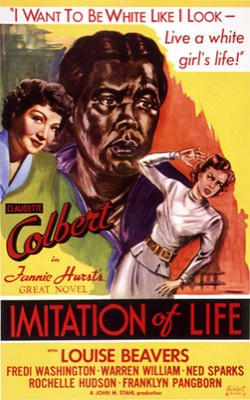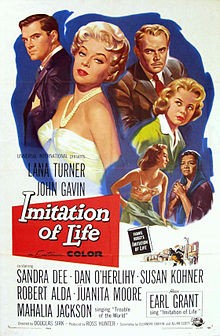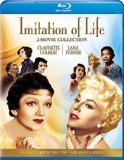| Reviews & Columns |
|
Reviews DVD TV on DVD Blu-ray 4K UHD International DVDs In Theaters Reviews by Studio Video Games Features Collector Series DVDs Easter Egg Database Interviews DVD Talk Radio Feature Articles Columns Anime Talk DVD Savant Horror DVDs The M.O.D. Squad Art House HD Talk Silent DVD
|
DVD Talk Forum |
|
|
| Resources |
|
DVD Price Search Customer Service #'s RCE Info Links |
|
Columns
|
|
|
Imitation of Life - 2-Movie Collection (1934 & 1959 versions)
But a direct comparison of the two tells a very different story. The original, 1934 version is in every way superior. Sirk's film is okay, but the screenplay makes alterations that critically shift attention away from the original story's strengths. The 1934 movie is vastly underrated and somewhat misunderstood, while the 1959 film is perhaps the least interesting of Sirk's big successes at Universal-International.
A single BD-50 contains both pictures, plus some good supplements including audio commentary tracks on both movies.
In the original, widowed single mother Bea Pullman (Claudette Colbert) struggles to carry on her late husband's business, selling maple syrup to local restaurants, grocery stores and the like. Overwhelmed trying to balance work while caring for her toddler daughter, Jessie, Bea agrees to take in a black housekeeper, Delilah Johnson (Louise Beavers), herself a widow with a daughter about the same age as Jessie, Peola. Physically, Peola takes after her father, a light-skinned African-American. Strangers assume she's white and unrelated to Delilah; wealthier families had refused to take both mother and daughter in.
Bea hits upon the idea of opening a pancake restaurant on the boardwalk as a means to market her husband's syrup with Delilah's exceptional pancakes, from an ages-old family recipe. A customer, Elmer Smith (Ned Sparks), encourages Bea to market the pancake flour and give up the restaurant. Several years pass, and both Bea and Delilah become wealthy.
However, the now college-aged Peola (Fredi Washington), troubled since childhood about her mixed-race status, resists her mother's efforts to send her to an exclusive but "Negro" school down South, preferring to live alone and pass for white. Jessie, meanwhile, on vacation from college, falls in love with Bea's suitor, ichthyologist Stephen Archer (Warren William).
The 1959 remake follows the same basic plot, but makes a few major changes along the way. In the remake Bea, here called Lora Meredith (Lana Turner), has ambitions to become a serious, Broadway actress, despite getting a late start. (Turner was about 38.) The Delilah character, here called Annie (Juanita Moore), is just along for the ride when, inevitably, Lora becomes a big Broadway star. The other big changes are that "Steve" Archer (John Gavin) is introduced into the story much earlier, and that Peola, here called Sarah Jane (Susan Kohner), dates a white man (Troy Donahue) who beats her upon learning that she's black.
Both movies are described as soapy melodramas, tearjerkers, but the 1934 version is really closer to the spirit of films by the Japanese director Yasujiro Ozu. In the original film, Bea and Delilah are single mothers absolutely devoted to ensuring that their daughters are cared for. Early scenes show both women working themselves to the point of physical exhaustion to keep creditors at bay, Bea using her womanly charms to win credit and gain enough time so that she can launch their joint business. Selling syrup, opening up a pancake shop and, eventually, selling boxes of pancake flour is hardly glamorous, but Delilah has that recipe of hers and works hard despite a lack of formal education, while Bea is cunning and a savvy business woman.
Their mirror-like devotion to their children bonds them emotionally. When the pancake flour proves a runaway success, Delilah is wealthy enough to own her own home, but she prefers to share Bea's big townhouse and otherwise live simply (partly, the film hints, because of her strong Christian faith). It has nothing to do with Delilah's engrained "mammy-ness"; the two women need one another equally.
In the remake, Lora comes off as selfish and unrealistic. Though the movie runs several minutes longer than the original, she spends much less screentime with her daughter, especially when she's an impressionable child. The remake doesn't even bother to suggest that Lora has some special talent as an actress, or even that much passion for acting as a craft. Rather, it projects a very naïve, even irresponsible notion that if one wants fame and success badly enough, success is just a matter of so many disappointments before one strikes gold.
In the original, Delilah shares in Bea's financial success, as a part-owner of the pancake flour business, while in the remake Annie is along for the ride: a maid at the beginning, a maid until the bitter end. Though Bea could be accused of exploiting Delilah's talents and image (prominently featured, like Aunt Jemima, in what today would be regarded as politically-incorrect advertising), Lora actually seems to be exploiting Annie more, with Lora chasing rainbows while Annie's at home scrubbing floors.
In its favor the remake has that scene of Sarah Jane being beaten by her white lover, strong stuff in racially tense 1959, but the movie undermines its power by casting a non-black in the role. Susan Kohner's mother is the Mexican actress Lupita Tovar (still living at 104!) and her father the famous Czech agent Paul Kohner. In the original movie, light-skinned African-American actress Fredi Washington played Peola, who indeed could have passed had she wanted to. But, unlike the character she played, Washington was proud of her race and later was quite active in the civil rights movement.
In the 1934 film, Deliliah pleads with Peola to accept her race and, more controversially, that working as, for instance, a housekeeper, was an honorable profession for black Americans during the Depression and nothing to be ashamed of. Peola, however, prefers the fantasy of passing, denying her heritage. In the remake, Sarah Jane's rejection of her race and specifically her mother strangely doesn't work, maybe because with the civil rights movement gaining momentum in 1959, it's almost like Sarah Jane is selfishly choosing to sit it out in order to reap the benefits of her lies.
The original, directed by John M. Stahl (the original Magnificent Obession, Leave Her to Heaven) actually avoids sentimentality, showing sweetly touching/painful scenes rather straightforwardly, allowing the character interactions and the uniformly fine acting to carry the day. The remake can't resist its own glossiness, with wall-to-wall music cueing viewers how to respond, and even opening with titles awash in a shower of scintillating diamonds as a Nat King Cole sound-alike (Earl Grant) sings the title song. In the original, a key funeral scene is dignified and credibly moving; in the remake it's merely overwrought.
In the original, Warren William leaves a strong impression as a hard-drinking, world-weary playboy-type so dazzled by Bea that he instantly reforms, and stays reformed, a twist on such characters in movies like this. (The ending is also unusually open-ended.) Where William is charming and believable, John Gavin, in the parallel role, is a stiff, and his clumsy, very ‘50s-type efforts to control Lora date the film more than the original does.
Video & Audio
Both movies look quite good, generally. The original, in black-and-white and standard 1.37:1 format, is a bit grainy but otherwise fine. Apparently the original title cards were lost at some point but have acceptably been recreated. The remake, in Universal-International's then common 2:1 widescreen, is a bit more problematic. Dissolves and other optical shots tend to look pretty terrible, but on straight cuts the image is very impressive. The cinematography seems to employ a lot of soft-focus shots of Lana Turner (to hide her middle-aged status) but the color is rich and the presentation very satisfying in the end. Both features have DTS-HD Master Audio 2.0 mono mixes, with subtitle options in English, Spanish, and French.
Extra Features
Avery Clayton, an African-American cultural scholar, provides the commentary for the 1934 film. It's insightful, but with that bane of commentary tracks, long gaps cricket-chirping silence, while the listener impatiently waits for his next remarks. A theatrical trailer seems geared for theaters then catering to "colored" audiences.
The remake also includes a trailer (disappointingly in standard-def), as a well as a commentary, this time with film historian Foster Hirsh, who makes the case for Imitation of Life as Sirk's masterpiece. (My vote is either Written on the Wind or All That Heaven Allows.) The other extra is an okay 30-minute featurette, also standard-def, called "Lasting Legacy: An ‘Imitation of Life.'"
Parting Thoughts
Both the 1934 and the 1959 Imitation of Life are engrossing, entertaining films, though seen back-to-back the original is far superior for reasons described above. The transfers are impressive, and the supplements are good. A DVD Talk Collector Series title.
Stuart Galbraith IV is the Kyoto-based film historian and publisher-editor of World Cinema Paradise. His credits include film history books, DVD and Blu-ray audio commentaries and special features.
|
| Popular Reviews |
| Sponsored Links |
|
|
| Sponsored Links |
|
|
| Release List | Reviews | Shop | Newsletter | Forum | DVD Giveaways | Blu-Ray | Advertise |
|
Copyright 2024 DVDTalk.com All Rights Reserved. Legal Info, Privacy Policy, Terms of Use,
Manage Preferences,
Your Privacy Choices | |||||||














